World Coffee Research releases new report on seed quality assurance, underscores opportunities to strengthen sector
Resource analyzes the status of seed lots in 5 key Latin American countries, provides a basis for cleanup, renovation, and additional infrastructure
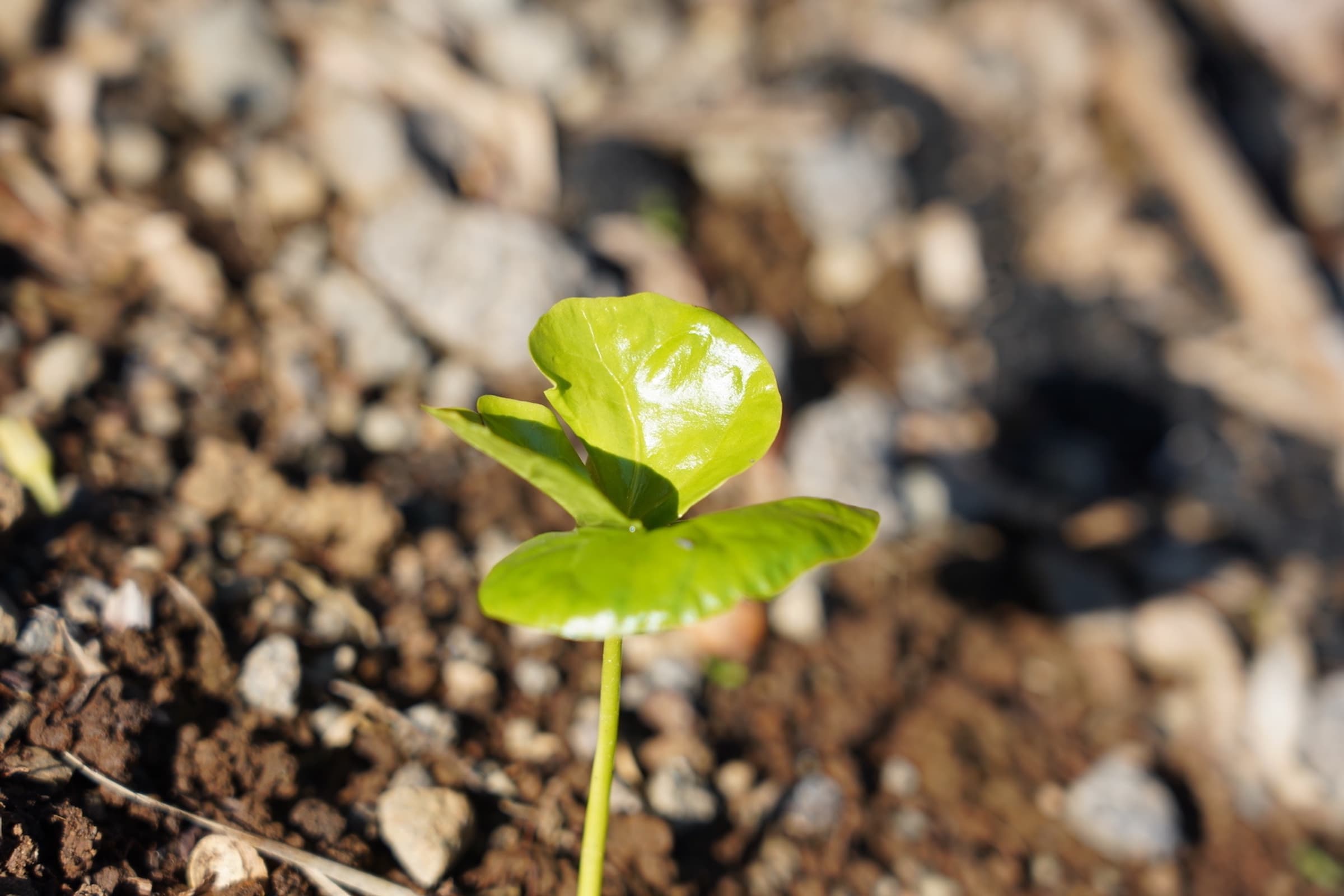
A coffee seedling sprouts its first leaves.
The lack of a formal coffee seed sector is one of the most important—and yet largely invisible—problems faced by the global coffee industry. A new technical report produced by World Coffee Research (WCR) assessing seed sources in El Salvador, Guatemala, Honduras, Nicaragua, and Peru, provides a multi-factor, multi-location analysis of the landscape for accessibility to seed supply and quality assurance of planting material in these countries.
The report and results therein underscore the overall importance of building infrastructure for a formal coffee seed sector in Latin America and other coffee-producing regions—such infrastructure would provide key support to farmers in making planting material that is genetically conforming and of high quality both available and accessible.
“Improved varieties support successful production for farmers and help secure supply for the industry,” notes Dr. Vern Long, Chief Executive Officer of WCR. “With many competing challenges facing coffee, it’s exciting to showcase the concrete steps our partners have taken to tackle quality assurance in planting material distribution systems. These efforts make quality seed more accessible and ensure that farmers can have confidence in the coffee trees they plant today—and can count on them to perform as expected in the decades ahead.”
Why seed systems matter
There is no one way that new and better plants arrive in a farmer’s hands—there are many pathways and there can be huge differences between countries depending on local laws and regulations, the market system, and farmer demand. With this, though, it is common for coffee growers to rely on informal and social relationships for propagating and obtaining planting material for new coffee trees, such as collecting seeds from their own fields or neighbors. They may also purchase seedlings from small local nurseries that often source their seeds from nearby formal or informal seed sources.
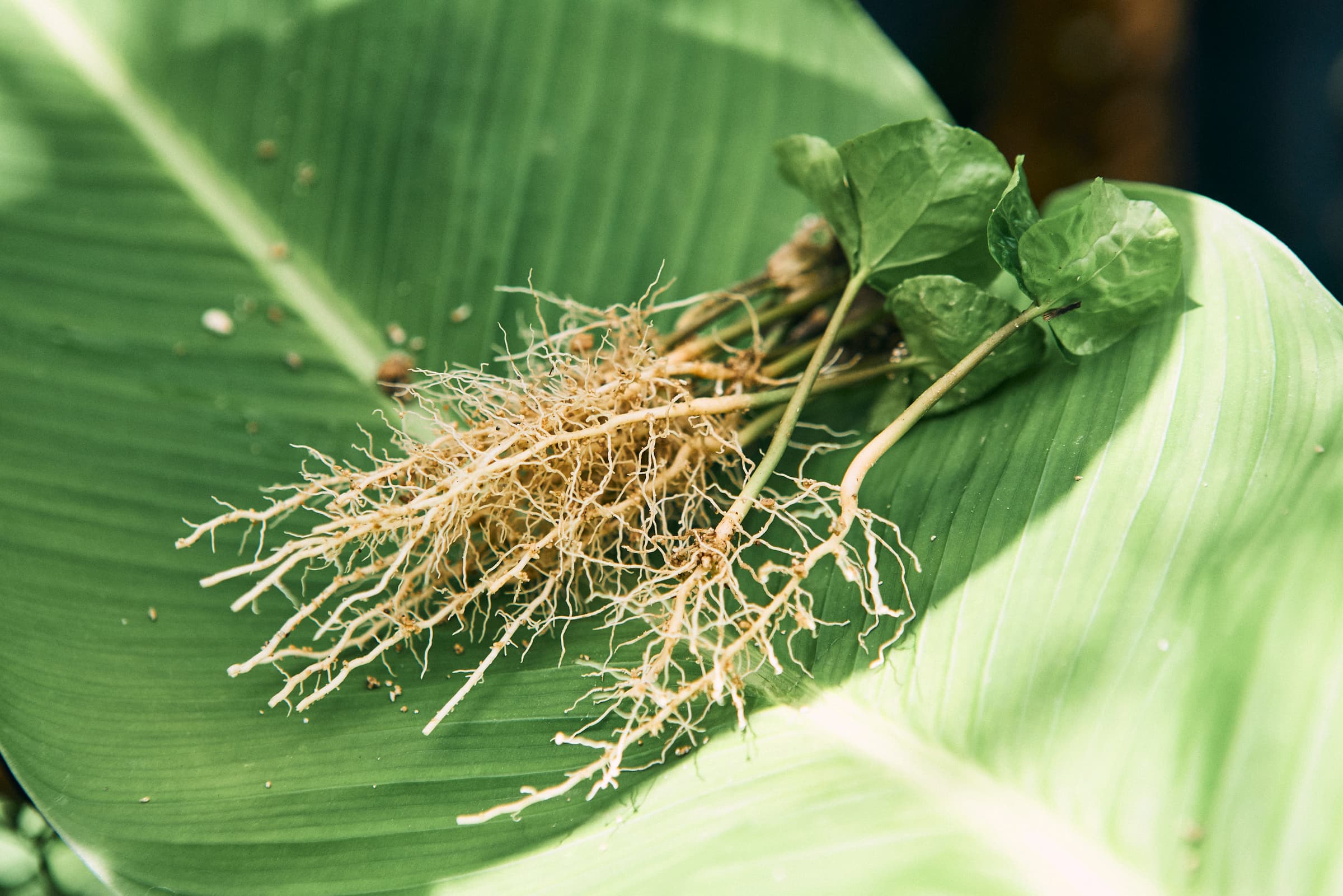
Exposed root systems of seedlings, Guatemala.
The quality of these local planting materials is often low due to a lack of phytosanitary and genetic conformity, which can lead to reduced yields throughout the resulting coffee tree’s 20–50-year lifetime. For example, coffee growers often create their own selection of plants based on what they observe to be the best-performing trees in their fields. They will then save seeds from these plants, reproduce them, and repeat the process over many years, creating their own unique crosses and populations. Growers will commonly misname these coffee plants or create new names for them, and the result is an increased probability of genetically mixed plants being used for seed and a decreased probability of plants performing as expected.
Alternatively, growers may seek and purchase seeds of specific varieties based on their expected characteristics like disease resistance, high yields, or cup quality, only to find they did not, in fact, receive these varieties once the coffee trees are grown. These discrepancies can amount to huge lifetime reductions in productivity, profitability, and climate resilience for farmers.
A formal coffee seed sector would address this issue by providing verified, high-quality planting material to coffee growers, who often operate on thin margins. Higher-yielding coffee trees that meet the quality requirements of the market would translate into higher income for these farmers and their communities.
Opportunities and challenges in Latin America’s seed systems
The lack of a formal coffee seed sector is particularly pronounced in Latin America, where coffee production depends largely on smallholders and is deeply intertwined with economic development in the region. Each country’s coffee sector has distinct characteristics and individualities that create opportunities and challenges for producing and maintaining access to quality seed.
Some countries, for instance, have specialized national research and technical assistance programs dedicated especially to coffee, whereas others have included regulation of the sector under the jurisdiction of preexisting government entities like the Ministry of Agriculture. Further, some countries allow new varieties and planting materials to be introduced and exchanged, while others rely solely on locally developed materials.
Genetic contamination of coffee in Latin America is common because of propagation practices and a lack of good agricultural practices (GAPs), introducing major risks into the coffee value chain. The recent coffee leaf rust crisis in the region sparked interest among coffee growers in renovating their farms and switching to disease-resistant coffee trees that allow them to maintain their cup quality as well. Many governments in the region are also prioritizing support for this effort. However, given the lack of an organized and professionalized seed sector, the region has no way of guaranteeing that the material sold to nurseries and producers is genetically conforming and of high phytosanitary quality.
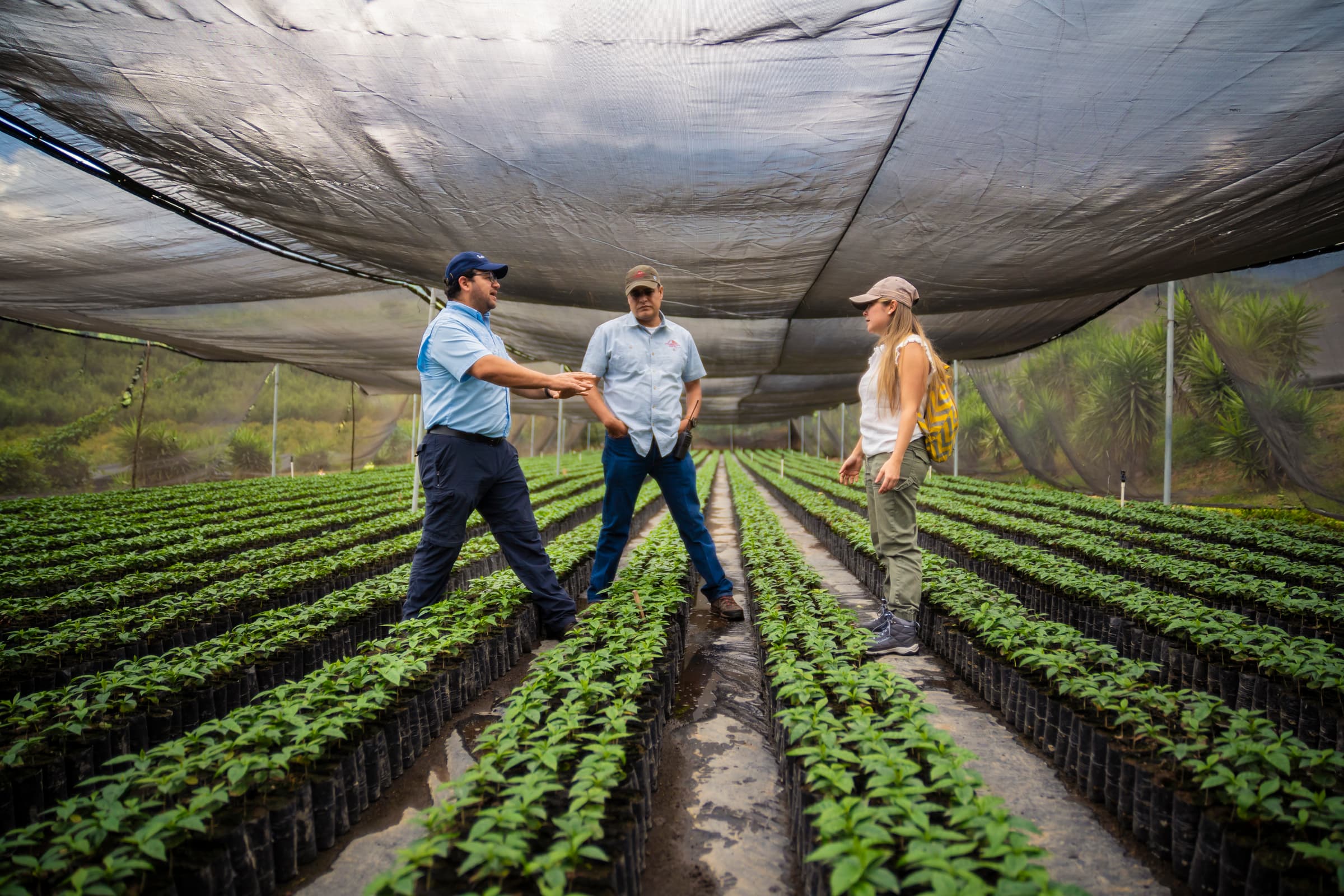
Emilia Umaña, WCR's Nursery Development Program Manager, visits a nursery in Guatemala.
Seed lot assessment: Key findings in El Salvador, Guatemala, Honduras, Nicaragua, and Peru
Through the United States Department of Agriculture (USDA)-funded Maximizing Opportunities in Cacao and Coffee in the Americas (MOCCA) program, WCR undertook activities to strengthen the seed sector for Arabica coffee across 5 major coffee-producing countries in Latin America, including El Salvador,1 Guatemala, Honduras, Nicaragua, and Peru. These activities helped WCR identify sector needs and training requirements for GAPs for growers as well as the current genetic quality of planting materials accessible to Arabica coffee farmers across these countries. This information has also helped identify the current genetic quality of planting materials accessible to coffee farmers in the region.
"Previously, we had a sense that genetic contamination was happening in Arabica plantations in the region,” said Emilia Umaña, WCR’s Nursery Development Program Manager, “The data found through this work create a window to look at this situation in a more proactive manner—we can better understand the consequences of not implementing GAPs that are specific for coffee seed production and, even more importantly, we can find and promote the best seed sources available."
In total, WCR surveyed 52 seed plantations in 2023 and genotyped leaf samples to assess the genetic conformity of their plants. WCR also supported the cleanup of 22 lots that had previously undergone a genetic assessment to eliminate plants that did not meet the genetic criteria for each given variety.
WCR’s resulting report highlights the findings from these activities to evaluate the practices and materials of local seed lots and plantations, identify promising seed sources, and improve nursery operations in these countries.
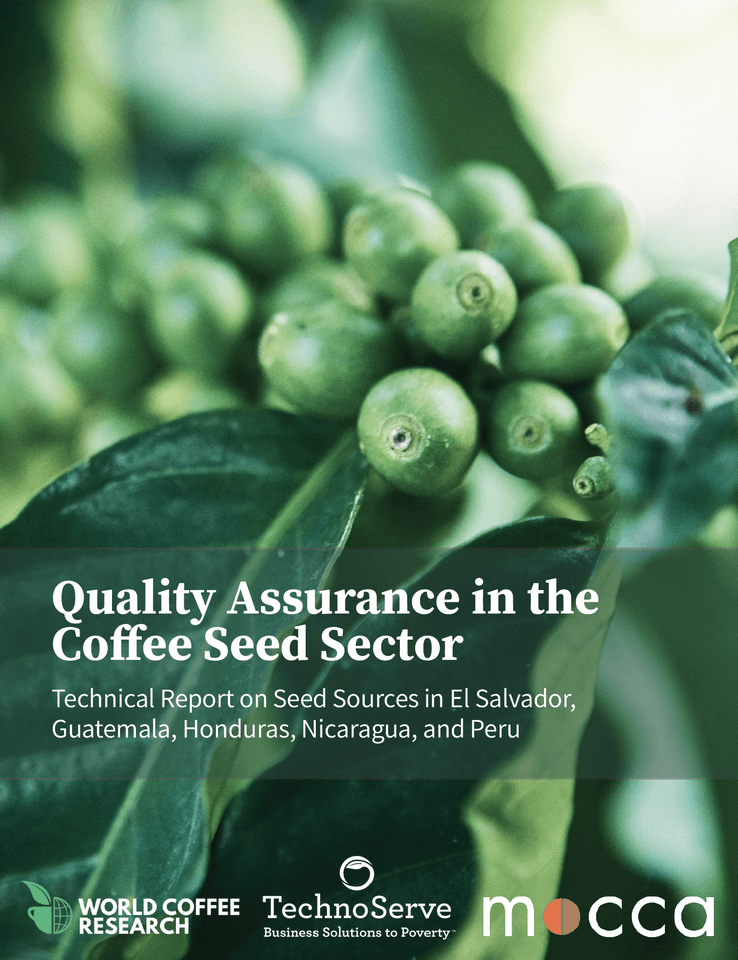
Quality Assurance in the Coffee Seed Sector
Key findings of this report include:
- Over 36% of participating seed lots had very high rates of genetic noncompliance, with 50% or fewer tested trees showing genetic conformity. Trees grown from these materials will not have the performance and characteristics sought by growers.
- Only 26% of seed lots had high rates of genetic conformity of 90% or higher. Three coffee varieties showed higher levels of compliance (i.e., Anacafe 14, Parainema, and Marsellesa) and seed lots that focused on producing them tended to have more true-to-type materials.
- Even when genetic conformity was present, seed plantations still didn’t always follow good agricultural practices for seed production, such as isolation to avoid cross-pollination, traceability protocols, and adequate storage, putting their seeds at risk of contamination.
- There exist structural challenges like the lack of official certification tools, low profitability as many producers are not willing to pay more for quality, and limited access to technical assistance for seed production all hold seed growers back.
This report includes the methodologies used to reach these findings as well as country-specific findings that can inform current and future activities to strengthen the coffee value chain in Latin America. WCR releases this report with the goal of unlocking benefits for local small-scale growers as well as coffee businesses and consumers around the world.
Forging a path for genetic traceability and DNA-verifiable varieties
While establishing a formal seed sector in Latin America and other coffee-producing countries globally will require significant effort and investment from national governments and the industry alike, WCR and its partners are continuing to forge a path for genetic conformity for nurseries and seed lots alike.
In 2023, WCR and MOCCA initiated CheckCAFE, a training program for established commercial nurseries that produce arabica coffee of DNA-verifiable varieties and have a production of at least 100,000 plants per year. The program seeks to promote compliance with good agricultural practices and genetic traceability.
CheckCAFE recently released its list of participating nurseries which will eventually graduate with certification of varieties that have reached genetic conformity greater than 90 percent.
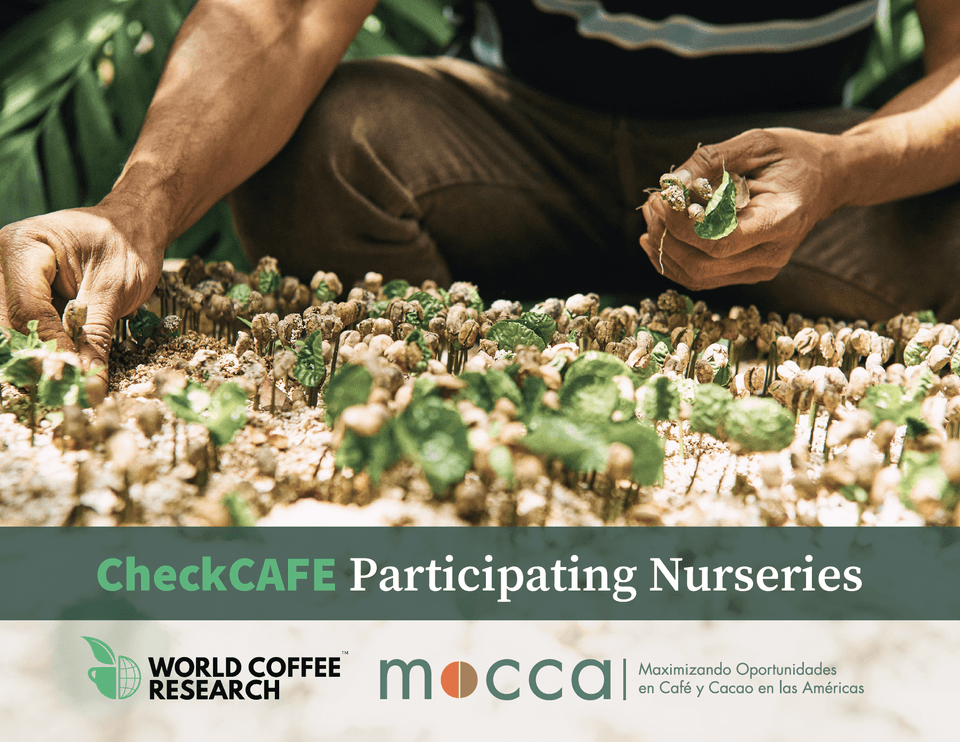
CheckCAFE Participating Nurseries
Even further, WCR released a parallel list of seed lots that underwent genetic evaluation between 2020 and 2023 in the same region and have been confirmed to be producing DNA-verifiable varieties. These sites were selected for inclusion because they are sources of seed in their communities, produce varieties that can be verified by DNA, and have homogenous lots. Of the lots sampled, those included in this list have 100% genetic purity for the sampled variety and have given their consent for their data to be published.
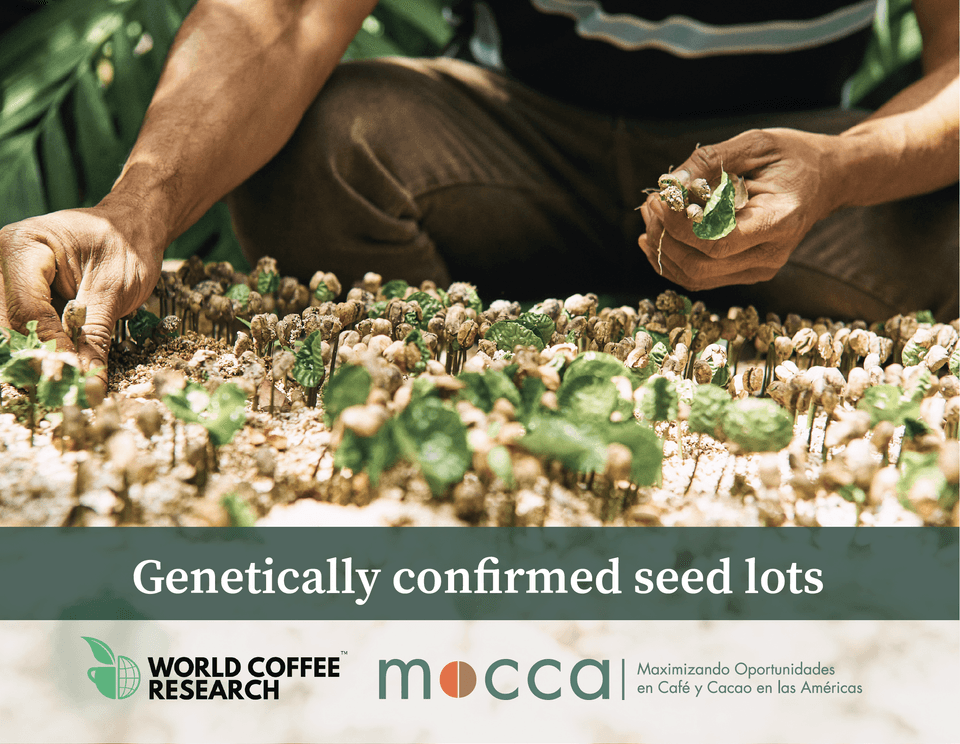
Genetically confirmed seed lots
WCR recognizes the tremendous value in supporting the professionalization of the coffee nursery and seed sector globally. Putting better tools in the hands of seed producers and nurseries worldwide allows for expanded access to improved, resilient varieties for smallholders, leading to increased production and improved livelihoods for farmers.
“This is the first time the coffee sector in Latin America has had access to genetic quality assurance tools, that, together with the implementation of GAPs, can start to create a change in the genetic quality of the seed sold throughout the region,” said Umaña. “This situation was inadvertently caused by the sector itself, and these tools are a step toward a more modern and professionalized seed value chain.”
“Quality Assurance in the Coffee Seed Sector: Technical Report on El Salvador, Guatemala, Honduras, Nicaragua, and Peru” was produced and adapted by World Coffee Research (WCR) under the scope of the Maximizing Opportunities in Cacao and Coffee in the Americas (MOCCA) program, funded by the United States Department of Agriculture (USDA) and implemented by a consortium led by TechnoServe.
Lavazza Professional, a WCR member company, made this report and other activities possible by providing crucial sponsorship and support for the MOCCA program.
1Data included in this report regarding the DNA analysis of materials in El Salvador comes from 2022 study in collaboration with the Inter-American Development Bank and the El Salvadoran Ministry of Agriculture. Read more about WCR’s support of the long-term revilitaization of El Salvador’s coffee sector here.